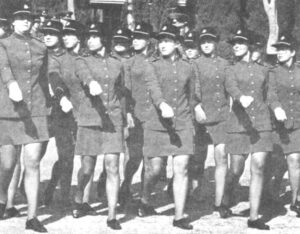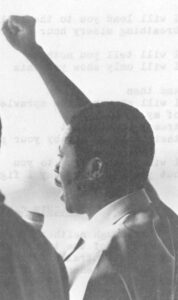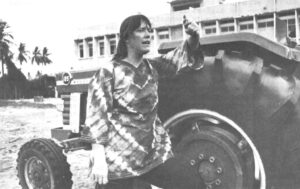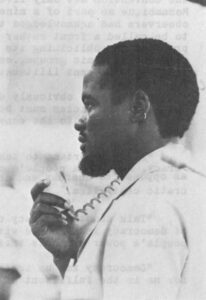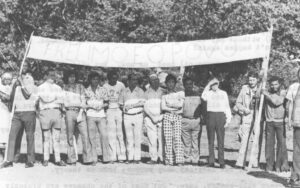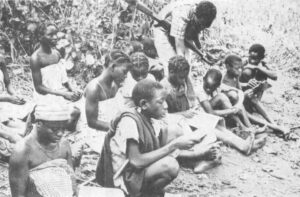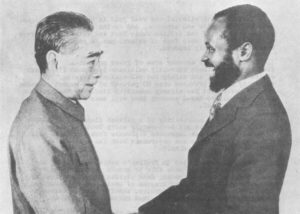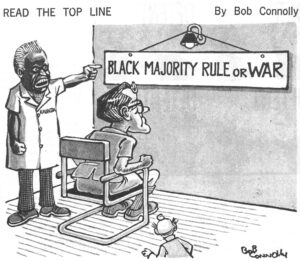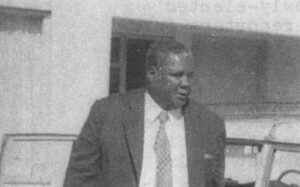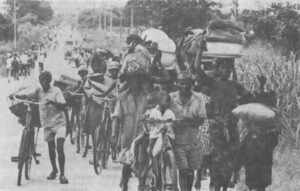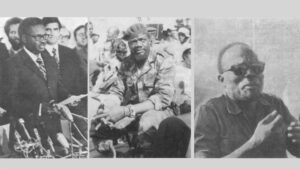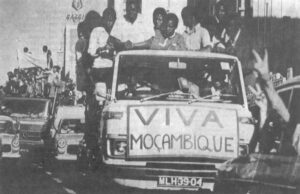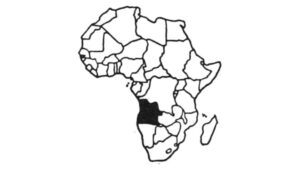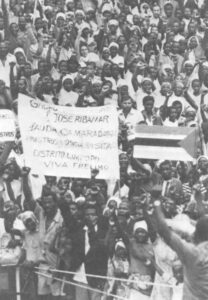The Rhodesian political situation is in limbo now more than ever since the government of Prime Minister Ian Smith declared unilateral independence a decade ago. External forces in both black and white African countries are pressuring vehemently for a peaceful settlement between the white government and the black nationalists. Yet the Prime Minister continues to declare that “black majority rule will never come to Rhodesia.”
Complicating the picture is the factionalized black nationalist movement, the African National Council (ANC). One side seems willing to compromise, another determined to escalate the guerrilla war on Rhodesia’s northeast border.
Although the ANC and Mr. Smith met recently to attempt a peaceful settlement, both sides also continue to escalate the recruitment and training of troops.
One of the most notable developments is the establishment of a women’s unit in the Rhodesian army and air force. Robin Wright recently interviewed several of the new enlistees on the eve of their induction in Salisbury and went with them for the first morning of training. Their views, which follow, reflect the hardening of white Rhodesian political opinions as the tension between blacks and whites reaches a crisis stage.
Salisbury, Rhodesia
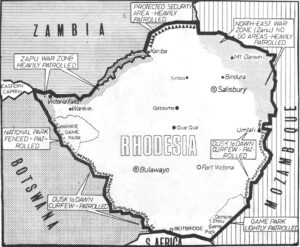 Jeanette Stokes is a personable and pretty 18-year-old Rhodesian whose clear blue eyes and freckles shine when she smiles shyly. Like most Rhodesian teenagers, her vocabulary is spiced with “jolly good” amid “keen fun” and “crums.” And, again like many youths here, she prefers to spend her time at tennis, swimming and anything outdoors.
Jeanette Stokes is a personable and pretty 18-year-old Rhodesian whose clear blue eyes and freckles shine when she smiles shyly. Like most Rhodesian teenagers, her vocabulary is spiced with “jolly good” amid “keen fun” and “crums.” And, again like many youths here, she prefers to spend her time at tennis, swimming and anything outdoors.
But most deeply, she is “keen” about her country.
So, while most of her friends from Townsend Girls School in Bulawayo are going to college or getting married, Jeanette has joined the new women’s unit of the Rhodesian army. On September 1 she took her oath and became a private.
The Rhodesian Women’s Service, which covers members in both the army and air force, is one of three recent moves by the government to beef up its 12,000-plus armed forces. Although there have been recent settlement efforts with black nationalists, the white Rhodesian government of Prime Minister Ian Smith has been at the same time increasing the recruitment and training of troops by scrapping college deferments, hiring more foreign “volunteers,” and inducting women.
The first group of 35 women (29 army, 6 air force) reported for duty on August 1. Jeanette was among the second set of 40 enlistees (33 army, 7 air force).
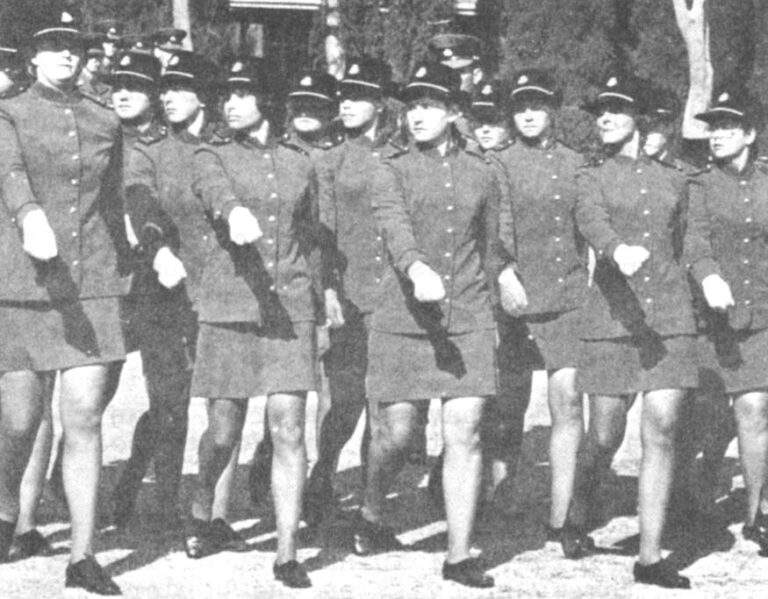
The reasons given for joining the new corps — such a sudden development that women’s uniforms were not ready for the first enlistees, who wore men’s fatigues — reflect the increasing concern by whites for the crisis-situation in this southern African country.
Jeanette, for example, admits she thinks black majority rule “is bound to come to Rhodesia. I don’t think this country can hold it off much longer.” But, she is willing to work to prevent it.
For now, the work done by the women’s corps will be mainly administrative, to free men to fight in the “operational zone” in Rhodesia’s northeast corner. But Jeanette says she would “not mind at all carrying a rifle. I think it would be great fun, a little scary but a fantastic experience.”
Although she predicts her parents would leave the country if blacks ever took control of the government, Jeanette claims: “I’m not going to run away as soon as there is trou1ble. I want to stick it out and help any way I can.”
 “I’m not a black lover, I’m afraid,” she admits candidly. “I don’t want black rule at all. This country would fall apart without white leadership.
“I’m not a black lover, I’m afraid,” she admits candidly. “I don’t want black rule at all. This country would fall apart without white leadership.
“For sure, I think Mr. Smith is a great guy. I have a lot of respect for him. He is trying his absolute damnedest to get a settlement peacefully for this country. He has a lot of guts — and brains.”
But she shrugs off the possibility of settlement efforts. “I hardly ever read the papers about it. I’m afraid I pretty much ignore it. I knew nothing would come of it. The blacks don’t really want settlement.”
About the African National Council (ANC) and its leadership she laughs, again shyly. “No, crums, I don’t know what’s happening with that lot.”
During a subsequent group interview with thirteen of the new enlistees — all of whom requested that they names be withheld — several expressed the same vehemence about the possibility of a black government in Rhodesia.
“We have a wonderful country and we don’t want to lose it,” a mid-thirties, former secretary declared angrily.
“I’ll do whatever I can to help,” another, younger woman offered. “I think most of us, maybe all of us, would be glad to see activity on the border (where fighting has been concentrated),” she added, receiving nods of agreement from her colleagues.
This eagerness to participate is part of the reason for establishment of the women’s corps. According to army officials, increasing numbers of letters from females requesting greater involvement in the “anti-terrorist war effort” than “knitting balaclavas and holding fundraising cake sales” was part of the reason for the government move.
 The magazine and newspaper recruiting campaign started in July and received over 1,000 inquiries by early August. Applications are accepted from anyone between l8 and 50, married or single. The majority of women in the second group of enlistees mere married and mothers.
The magazine and newspaper recruiting campaign started in July and received over 1,000 inquiries by early August. Applications are accepted from anyone between l8 and 50, married or single. The majority of women in the second group of enlistees mere married and mothers.
Part of the enthusiasm may be due to the fact that the women’s military life is restricted to daytime jobs. Most women will continue to live at home. After the two-week training course in Salisbury, Jeanette, for example, will return to Bulaway to live with her parents, working at the army base there between 8 a.m. and 4:30 p.m.
The jobs available to women include: radio operating, teleprinting, operational room duties, clerical and store administration, intelligence work, driving and catering, photographic interpreting, medical and dental assistance, and computer analysis.
The opportunity to try a new profession was also part of the attraction. As Jeanette said: “I was bored silly in my job as a key-punch operator. I wanted to try something different.”
Like the majority of women who enlisted, Jeanette would be working anyway. Most appear to be middle and lower-middle class whites who need the $285-$421 per month military pay to support their families.
But financial considerations were minor. Each woman interviewed claimed a political or patriotic reason for enlisting.
“My boyfriend, who is an army medic, influenced me a lot,” Jeanette said. “He told me about incidents on the border, how guys were getting burned up, blown to bits and injured for life. It made me mad and excited about doing something.”
The news media — especially local television, which concentrates daily on the border war, extensively interviewing the wounded and filming the dead — appears to have influenced the women as much as the lower-key enlistment campaign.
“My maternal instincts, for my country as well as those men, can’t bear the sight of our boys getting torn up like that. I can’t sit by and not help,” a late-forties mother of two explained.
All of the women say they have received encouragement and praise from relatives and friends for their enlistment. “My parents thought it was a tremendous idea and they liked my courage,” Jeanette explained. “my sister thought it a jolly good idea and wanted to join too, but she’s still at Cape Town Varisty (in South Africa).”
“My husband couldn’t get me in fast enough,” a late-twenties mother of three added. “He was most eager for me to join.”
None of the women outwardly expressed hesitation or fear, even at the idea of fighting at the border if called upon. “It was the greatest decision of my life,” Jeanette smiled with pride. “And I’m pleased that I’ve made it. Now I can help prevent the destruction of my country.”
Received in New York on September 15, 1975
©1975 Robin Wright
Robin Wright is an Alicia Patterson Foundation award winner on leave from The Christian Science Monitor. This article may be published with credit to Robin Wright, The Christian Science Monitor, and the Alicia Patterson Foundation.

